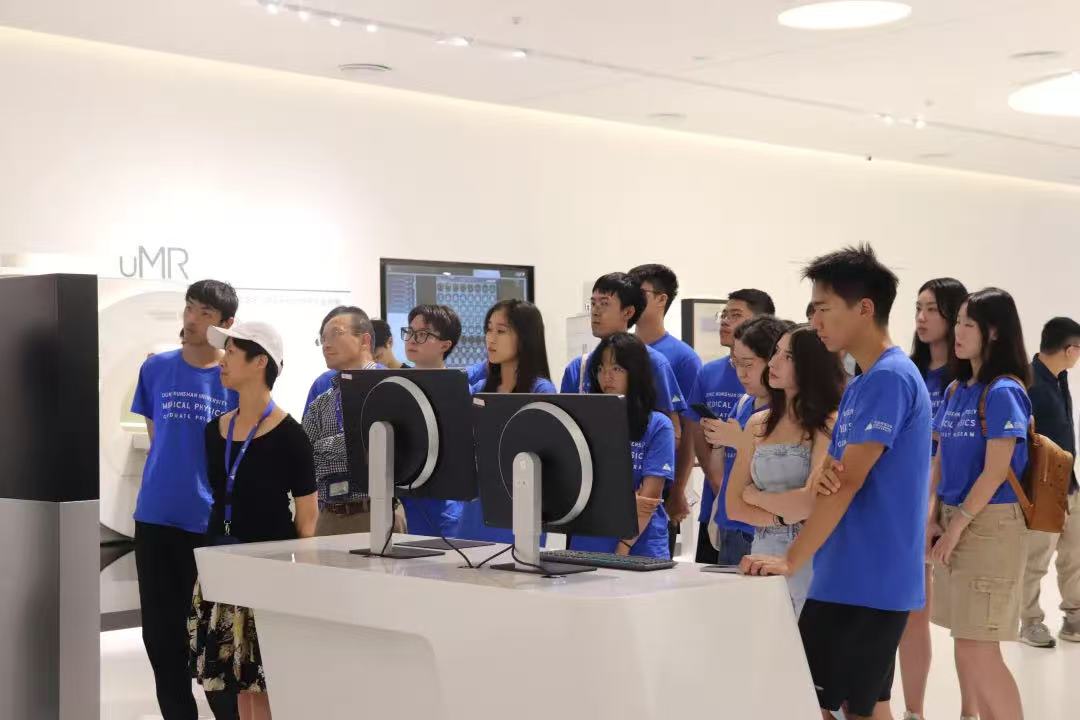

The Precision Diagnosis and Treatment for Cancer Program is organized by Medical Physics Graduate Program of Duke Kunshan University and its principal instructors, aiming to provide students with a great opportunity to deeply explore the field of medical physics. Medical physics is an emerging interdisciplinary field that integrates physics, engineering, biology, medicine, and computer science tools to address the needs in healthcare. Here, students can transform their knowledge in physics, engineering, and other sciences into interdisciplinary expertise in combating cancer and other diseases.
Gain hands-on experience in applying machine learning and data analysis to real-world oncology research, understanding how AI supports diagnosis, treatment, and precision medicine.
Strengthen scientific reasoning, analytical judgment, and data interpretation skills to address complex research questions.
Collaborate with peers from diverse academic backgrounds and present research outcomes through a final group presentation, improving teamwork and scholarly communication.
Engage in meaningful discussions with international professors and peers, gaining exposure to cutting-edge research ideas and global learning experiences.
Outstanding participants may receive recommendation letters from professors in recognition of their research ability, teamwork, and academic potential.

Fang-Fang Yin is Gustavo S. Montana Distinguished Professor in the Department of Radiation Oncology at Duke University. He is Professor and Director of Medical Physics Graduate Program at Duke Kunshan University. He is Fellow of American Association of Physicists in Medicine (AAPM), and Fellow of American Society for Radiation Oncology (ASTRO). He received his Ph.D. in Medical Physics from the University of Chicago, M.S. in Physics from Bowling Green State University, and B.S. in Physics from Zhejiang University. Prof. Yin’s research interests include stereotactic radiosurgery, stereotactic body radiation therapy, treatment planning optimization, knowledge guided radiation therapy, intensity-modulated radiation therapy, image-guided radiation therapy, oncological imaging and informatics, and quality improvement and assurance.

Lei Zhang is an Assistant Professor of Medical Physics at Duke Kunshan University (DKU). Prior to joining DKU, he was a postdoctoral research fellow at University of North Carolina at Chapel Hill. He received his Ph.D. in Medical Physics from Duke University, M.S. in Biomedical Engineering from Washington University in St. Louis, and B.S. in Electrical Engineering from University of Science and Technology of China. Prof. Zhang’s primary research goals include: 1) improving medical image quality for high standard clinical neuroscience/brain research; and 2) developing information extraction and image guidance methods for accurate and precise cancer radiation therapy clinical workflow. His main research interests include: MR metal artifact reduction, MR image synthesis, brain segmentation, multi-modal imaging, image-guided radiation therapy (4D-MRI, 5D-MRI), gel-based 3D dosimetry, and nanomedicine.

Manju Liu, Ph.D. is a graduate of Wayne State University (Detroit). She completed her Medical Physics Residency at Henry Ford Hospital, and worked as a staff medical physicist at Beaumont Health System before joining DKU. Dr. Liu is board-certified in Therapeutic Medical Physics by the American Board of Radiology. Dr. Liu is specialized in External Beam Therapy, Brachy Therapy, and Magnetic Resonance Imaging (MRI). She has authored multiple peer-reviewed journal articles and book chapters, and is also a manuscript reviewer of peer-reviewed medical physics journals. Her research interests include Monitoring Tumor Response to Radiation Therapy Using Multi-parametric Magnetic resonance Imaging, MRI-guided Real-time Tumor Tracking, MRI-compatible immobilization device design, Spatially Fractionated Radiation Therapy, Investigating Abnormal Iron Deposition in Human Brain with MRI, Investigating Abnormal Venous Blood and Brain Water Matter Hyper-intensity in Parkinson Patients with MRI.

Zhenyu Yang is a Research Assistant Professor of Medical Physics at Duke Kunshan University (DKU). His research focus is applying the cutting-edge AI techniques in medical image analysis. He is especially interested in developing novel deep learning models, machine learning models, and radiomics models to lung cancer prognosis prediction, lung function prediction, brain tumor segmentation, etc. His teaching interests at Duke Kunshan include photon radiation therapy, medical image analysis, nuclear medicine, etc.
He has published 11 peer-reviewed articles in both the medical physics and physics fields on Medical Physics, Physical Review E, etc. He also has 17 conference abstracts, including 8 oral presentations, at annual meetings of the Radiosurgery Society (RSS) and the American Association of Physicists in Medicine (AAPM). Zhenyu also received the Best Abstract Award of the AAPM annual meeting, the John R. Cameron Young Investigator Competition Finalist of the AAPM annual meeting, and the Members in Training Research Achievement Awards of the RSS annual meeting.
Zhenyu has a Bachelor of Science in Applied Physics from Southeast University, a Master of Science degree in Medical Physics from Duke Kunshan University, and a Ph.D. degree in Medical Physics from Duke University.

Xiaoyu Duan is a Research Assistant Professor of Medical Physics at Duke Kunshan University (DKU). She received her Ph.D. in Biomedical Engineering (Medical Physics track) from Stony Brook University in New York, M.S. in Medical Physics from Duke University, and B.S. in Physics from Nanjing University. Her research interests are 1) developing advanced techniques to improve image quality of breast imaging, including digital mammography, digital breast tomosynthesis, contrast-enhanced digital mammography, and contrast-enhanced digital breast tomosynthesis; 2) investigating machine learning or deep learning algorithms for breast cancer prediction and lesion type characterization; 3) optimizing imaging systems and protocols for breast cancer screening and diagnosis through virtual clinical trials and novel detectors. Her teaching interests at Duke Kunshan include nuclear medicine, medical image analysis, practicum for diagnosis imaging, etc.

Email: DKU-GSI@dukekunshan.edu.cn
